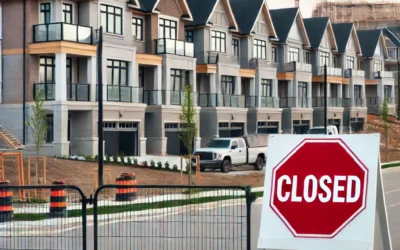What Happens When a Real Estate Closing Delay Occurs in Ontario?
Real estate closing delays in Ontario can create legal and financial complications for buyers and sellers. Whether caused by financing issues, paperwork delays, or unforeseen disputes, missing a closing date can result in deposit forfeiture, legal claims, or financial penalties can create legal and financial complications for buyers and sellers. This article examines key legal and financial consequences of a delayed real estate closing in Ontario, including:
- What happens to the deposit if the buyer fails to close?
- How extensions can be negotiated to avoid legal disputes.
- The seller’s right to recover financial losses due to a failed closing.
- The buyer’s obligations and risks if they cannot complete the transaction.
This guide also reviews Ontario case law relevant to real estate closings, providing insight into how courts have addressed these issues.
The Deposit: Can You Lose It?
In most real estate transactions, the buyer provides a deposit as a gesture of good faith. If the buyer fails to close on time, the deposit is often at risk. Under Ontario law, the deposit typically serves as security for the seller, but forfeiture is not automatic. Courts will assess whether the seller is entitled to keep the deposit, usually depending on whether the buyer’s failure to close constitutes a breach of contract.
Example: Azzarello v. Shawqi (2019 ONSC 1048)
Imagine a young couple, excited about purchasing their first home, failing to secure financing in time for the closing date. In this case, the court upheld the seller’s right to retain the deposit when the buyers were unable to fulfill their contractual obligations. The decision reinforced that deposits play a critical role in ensuring buyers adhere to agreements. However, the court also noted that sellers must demonstrate a clear breach to justify retaining the deposit.
Extensions: Negotiating a Solution
When delays arise, parties often consider extending the closing date to avoid litigation. Extensions require mutual agreement, usually formalized through an amendment to the Agreement of Purchase and Sale (APS).
Key points to address in extension negotiations include:
- Additional Deposit: Sellers often request an increased deposit as security.
- Compensation: Buyers may agree to cover the seller’s carrying costs during the extension period.
- Firm Deadlines: Clearly define the new closing date to avoid further ambiguities.
Consider a scenario where a family selling their home agrees to a one-week extension after the buyer’s bank delays the release of mortgage funds. By negotiating compensation for their additional carrying costs, the sellers protect their interests while giving the buyers time to resolve their issues.
Failing to agree on an extension can escalate the dispute, forcing the parties into litigation.
Recovering Losses: Remedies for the Seller
If the buyer’s failure to close results in financial losses, the seller can pursue damages. These may include:
- Loss of Sale Price: If the property is resold for less than the original price.
- Carrying Costs: Additional mortgage payments, taxes, or utilities incurred due to the delay.
- Other Expenses: Legal fees, staging costs, or realtor commissions.
Example: Mouradian v. Groleau (2022 ONSC 2925)
In this case, a buyer defaulted on the purchase of a residential property after being unable to sell her other properties to secure financing. Despite her best efforts, including staging and relisting her properties, she could not close the transaction. The seller resold the home for a higher price but retained the buyer’s $70,000 deposit as compensation. The court ruled that retaining the deposit was fair, as it served as security for the transaction and was not a penalty. This case illustrates that even if a seller resells the property for a higher price, the deposit can still be forfeited if the buyer breaches the contract.
Obligations of the Recovering Party
Parties seeking damages must mitigate their losses. This means the seller must take reasonable steps to reduce the financial impact of the buyer’s default, such as relisting the property promptly or accepting a reasonable resale offer.
Example: Mattamy (Jock River) Ltd. v. Ishola (2024 ONSC 6231)
In this case, the buyer failed to close on the purchase of a residential property. The seller promptly re-listed the property and sold it at a lower price in a declining market. The court found that the seller had taken reasonable and timely steps to mitigate losses, including marketing the property effectively and accepting a fair resale price. The seller was awarded damages covering the shortfall between the original purchase price and the resale price, as well as additional costs like real estate fees and legal expenses. This case highlights the importance of prompt action and documentation in proving mitigation efforts.
Why Choose Bozai Law for Real Estate Disputes?
Delays in closing can lead to significant financial and legal complications for both buyers and sellers. At Bozai Law, we understand the stress these situations can cause and have the expertise to guide you through every step. Whether negotiating an extension, recovering damages, or defending against claims, our team ensures your rights are protected and your interests prioritized.
Reach out to us today to resolve your real estate disputes efficiently and effectively. Let us handle the complexities so you can focus on moving forward!
For more details on real estate closing rules in Ontario, refer to the Ontario Real Estate Association (OREA)
Disclaimer
The information provided in this article is for general informational purposes only and does not constitute legal advice. Reading this article does not create a lawyer-client relationship between you and Bozai Law. Every legal situation is unique, and the application of law varies depending on specific circumstances.
If you require legal advice tailored to your situation, you should consult a qualified lawyer before taking any action. Bozai Law expressly disclaims all liability for any reliance placed on the information contained herein.
For legal assistance, please contact Bozai Law at info@bozailaw.com to schedule a consultation.





0 Comments